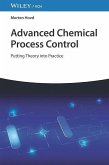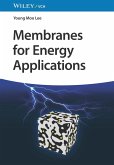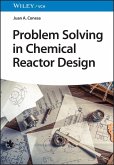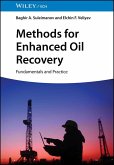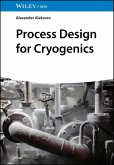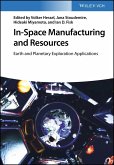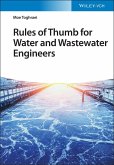Applied Circular Economy Engineering
Technologies and Business Solutions to Implement Circularity
Herausgegeben:Araujo, Juliano B.; Hinderer, Henning; Viere, Tobias; Woidasky, Jörg
Applied Circular Economy Engineering
Technologies and Business Solutions to Implement Circularity
Herausgegeben:Araujo, Juliano B.; Hinderer, Henning; Viere, Tobias; Woidasky, Jörg
- Gebundenes Buch
- Merkliste
- Auf die Merkliste
- Bewerten Bewerten
- Teilen
- Produkt teilen
- Produkterinnerung
- Produkterinnerung
The book is offering current research on and insights into the implementation of circular economy in industrial practice. It comprises a whole range of solutions and concepts from engineering and business research. The scope of the book will use the European Circular Economy Package conceptual structure to cover the most relevant material and product flows such as metals, polymers, and food, as well as relevant product life cycle steps such as product design, material extraction, and recycling.
Andere Kunden interessierten sich auch für
![Advanced Chemical Process Control Advanced Chemical Process Control]() Morten HovdAdvanced Chemical Process Control83,99 €
Morten HovdAdvanced Chemical Process Control83,99 €![Membranes for Energy Applications Membranes for Energy Applications]() Young Moo LeeMembranes for Energy Applications111,99 €
Young Moo LeeMembranes for Energy Applications111,99 €![Problem Solving in Chemical Reactor Design Problem Solving in Chemical Reactor Design]() Juan A. ConesaProblem Solving in Chemical Reactor Design90,99 €
Juan A. ConesaProblem Solving in Chemical Reactor Design90,99 €![Methods for Enhanced Oil Recovery Methods for Enhanced Oil Recovery]() Baghir A. SuleimanovMethods for Enhanced Oil Recovery118,99 €
Baghir A. SuleimanovMethods for Enhanced Oil Recovery118,99 €![Process Design for Cryogenics Process Design for Cryogenics]() Alexander AlekseevProcess Design for Cryogenics125,99 €
Alexander AlekseevProcess Design for Cryogenics125,99 €![In-Space Manufacturing and Resources In-Space Manufacturing and Resources]() In-Space Manufacturing and Resources149,00 €
In-Space Manufacturing and Resources149,00 €![Rules of Thumb for Water and Wastewater Engineers Rules of Thumb for Water and Wastewater Engineers]() Moe ToghraeiRules of Thumb for Water and Wastewater Engineers90,99 €
Moe ToghraeiRules of Thumb for Water and Wastewater Engineers90,99 €-
-
-
The book is offering current research on and insights into the implementation of circular economy in industrial practice. It comprises a whole range of solutions and concepts from engineering and business research. The scope of the book will use the European Circular Economy Package conceptual structure to cover the most relevant material and product flows such as metals, polymers, and food, as well as relevant product life cycle steps such as product design, material extraction, and recycling.
Produktdetails
- Produktdetails
- Verlag: Wiley-VCH
- Artikelnr. des Verlages: 1135395 000
- 1. Auflage
- Seitenzahl: 320
- Erscheinungstermin: Juli 2025
- Englisch
- Abmessung: 254mm x 178mm x 25mm
- Gewicht: 666g
- ISBN-13: 9783527353958
- ISBN-10: 352735395X
- Artikelnr.: 74154832
- Herstellerkennzeichnung
- Wiley-VCH GmbH
- Boschstraße 12
- 69469 Weinheim
- wiley-vch@kolibri360.de
- Verlag: Wiley-VCH
- Artikelnr. des Verlages: 1135395 000
- 1. Auflage
- Seitenzahl: 320
- Erscheinungstermin: Juli 2025
- Englisch
- Abmessung: 254mm x 178mm x 25mm
- Gewicht: 666g
- ISBN-13: 9783527353958
- ISBN-10: 352735395X
- Artikelnr.: 74154832
- Herstellerkennzeichnung
- Wiley-VCH GmbH
- Boschstraße 12
- 69469 Weinheim
- wiley-vch@kolibri360.de
Dr. Juliano Bezerra de Araujo studied Production Engineering at the Federal University of Sao Carlos and did his doctorate at the University of Sao Paulo in the area of sustainable manufacturing. He has worked in the areas of operations management, sustainability consulting, business intelligence, as a lecturer in undergraduate and graduate courses, as well as a researcher both in business and academic environments. Since 2023, he is a visiting scientist at Pforzheim University¿s Institute for Industrial Ecology and conducts research on CE and corporate sustainability. Prof. Dr.-Ing. Henning Hinderer studied Business Administration and Engineering at the German Stuttgart University. After establishing a Spanish production site, he transferred to the Stuttgart-based Fraunhofer-Institute for Industrial Engineering (IAO), where he received his PhD, and was appointed head of department. In 2006 he became associated partner and head of procurement and logistics of a Porsche Services company. 2011 he was appointed professor at Pforzheim University for Business Administration and Technical Sales, currently serving as vice dean and the head of the Business Administration and Engineering department. His research focuses on strategic and technical aspects of value chains e.g. for automobiles. Prof. Dr. Tobias Viere studied environmental and sustainability sciences and received a PhD in business studies. He worked in international capacity building projects on cleaner production in South-East Asia before joining a software and solution provider in the field of LCA, industrial ecology and CE. Since 2013 he is a professor at Pforzheim University?s business school, directs the master program M.Sc. Life Cycle & Sustainability and conducts research on CE, LCA and corporate sustainability at the University?s Institute for Industrial Ecology. Prof. Dr.-Ing. Jörg Woidasky studied "Technical Environmental Protection" at the Technical University of Berlin and did his doctorate in mechanical engineering at the University of Stuttgart on the recycling of plastic fuel tanks. From 1994 to 2012 he worked at the Fraunhofer Institute for Chemical Technology (ICT) in Pfinztal in the field of recycling and waste management. In 2012, he was appointed Professor of Sustainable Product Development at the Faculty of Engineering at Pforzheim University. His research and teaching areas are sustainable process and product design for the implementation of the "Circular Economy".
Part I: Introduction
1. Challenges and Perspectives of Applying Circular Economy in Business and Engineering
Part II: Materials (Selection, Properties)
2. Aluminum Alloys, Recycling, and the Circular Economy
3. Circular Economy of Polymers - Its Current State in Germany and Beyond
4. Implementing Circular Value Creation in the Construction Sector
Part III: Products (Design, Servitization)
5. Circular Process Implementation for Electric Drives - Experiences and Examples
6. Circularity in the Healthcare Industry
7. Circular Economy Indicators for Product Design - Calculation and Applicability
8. Makigami of an Industrial Product Development Process: Use of a Lean Methodology to Integrate Sustainable and Circular Product Design
Part IV: Technology (Production and Business Processes)
9. Single-stage Sorting and Marker Technology for a Circular Economy of Polymers
10. Embracing Entomophagy: Insects as Catalysts for Sustainable Circular Economies
11. Digital Technologies for Enabling and Engineering the Circular Economy
Part V: Organization (Management, Business Models)
12. Finding Ideas for Sustainability-oriented Innovations: Using Circular Business Models for Innovation
13. Circular Economy Business Models and Ecodesign Approaches in Practice - A Case Study Literature Review
14. The IRMa Approach - Integrative Resource Efficiency Management in Small and Medium-sized Enterprises
Part VI: Contextualization of Circular Economy Engineering
15. Cultural and Cross-cultural Requirements of Circular Economy Engineering: Addressing Issues of Global Responsibility, Social Sustainability, and Ethics
16. The Actual Goals and Limits of Circular Economy - A Critical Perspective
1. Challenges and Perspectives of Applying Circular Economy in Business and Engineering
Part II: Materials (Selection, Properties)
2. Aluminum Alloys, Recycling, and the Circular Economy
3. Circular Economy of Polymers - Its Current State in Germany and Beyond
4. Implementing Circular Value Creation in the Construction Sector
Part III: Products (Design, Servitization)
5. Circular Process Implementation for Electric Drives - Experiences and Examples
6. Circularity in the Healthcare Industry
7. Circular Economy Indicators for Product Design - Calculation and Applicability
8. Makigami of an Industrial Product Development Process: Use of a Lean Methodology to Integrate Sustainable and Circular Product Design
Part IV: Technology (Production and Business Processes)
9. Single-stage Sorting and Marker Technology for a Circular Economy of Polymers
10. Embracing Entomophagy: Insects as Catalysts for Sustainable Circular Economies
11. Digital Technologies for Enabling and Engineering the Circular Economy
Part V: Organization (Management, Business Models)
12. Finding Ideas for Sustainability-oriented Innovations: Using Circular Business Models for Innovation
13. Circular Economy Business Models and Ecodesign Approaches in Practice - A Case Study Literature Review
14. The IRMa Approach - Integrative Resource Efficiency Management in Small and Medium-sized Enterprises
Part VI: Contextualization of Circular Economy Engineering
15. Cultural and Cross-cultural Requirements of Circular Economy Engineering: Addressing Issues of Global Responsibility, Social Sustainability, and Ethics
16. The Actual Goals and Limits of Circular Economy - A Critical Perspective
Part I: Introduction
1. Challenges and Perspectives of Applying Circular Economy in Business and Engineering
Part II: Materials (Selection, Properties)
2. Aluminum Alloys, Recycling, and the Circular Economy
3. Circular Economy of Polymers - Its Current State in Germany and Beyond
4. Implementing Circular Value Creation in the Construction Sector
Part III: Products (Design, Servitization)
5. Circular Process Implementation for Electric Drives - Experiences and Examples
6. Circularity in the Healthcare Industry
7. Circular Economy Indicators for Product Design - Calculation and Applicability
8. Makigami of an Industrial Product Development Process: Use of a Lean Methodology to Integrate Sustainable and Circular Product Design
Part IV: Technology (Production and Business Processes)
9. Single-stage Sorting and Marker Technology for a Circular Economy of Polymers
10. Embracing Entomophagy: Insects as Catalysts for Sustainable Circular Economies
11. Digital Technologies for Enabling and Engineering the Circular Economy
Part V: Organization (Management, Business Models)
12. Finding Ideas for Sustainability-oriented Innovations: Using Circular Business Models for Innovation
13. Circular Economy Business Models and Ecodesign Approaches in Practice - A Case Study Literature Review
14. The IRMa Approach - Integrative Resource Efficiency Management in Small and Medium-sized Enterprises
Part VI: Contextualization of Circular Economy Engineering
15. Cultural and Cross-cultural Requirements of Circular Economy Engineering: Addressing Issues of Global Responsibility, Social Sustainability, and Ethics
16. The Actual Goals and Limits of Circular Economy - A Critical Perspective
1. Challenges and Perspectives of Applying Circular Economy in Business and Engineering
Part II: Materials (Selection, Properties)
2. Aluminum Alloys, Recycling, and the Circular Economy
3. Circular Economy of Polymers - Its Current State in Germany and Beyond
4. Implementing Circular Value Creation in the Construction Sector
Part III: Products (Design, Servitization)
5. Circular Process Implementation for Electric Drives - Experiences and Examples
6. Circularity in the Healthcare Industry
7. Circular Economy Indicators for Product Design - Calculation and Applicability
8. Makigami of an Industrial Product Development Process: Use of a Lean Methodology to Integrate Sustainable and Circular Product Design
Part IV: Technology (Production and Business Processes)
9. Single-stage Sorting and Marker Technology for a Circular Economy of Polymers
10. Embracing Entomophagy: Insects as Catalysts for Sustainable Circular Economies
11. Digital Technologies for Enabling and Engineering the Circular Economy
Part V: Organization (Management, Business Models)
12. Finding Ideas for Sustainability-oriented Innovations: Using Circular Business Models for Innovation
13. Circular Economy Business Models and Ecodesign Approaches in Practice - A Case Study Literature Review
14. The IRMa Approach - Integrative Resource Efficiency Management in Small and Medium-sized Enterprises
Part VI: Contextualization of Circular Economy Engineering
15. Cultural and Cross-cultural Requirements of Circular Economy Engineering: Addressing Issues of Global Responsibility, Social Sustainability, and Ethics
16. The Actual Goals and Limits of Circular Economy - A Critical Perspective


